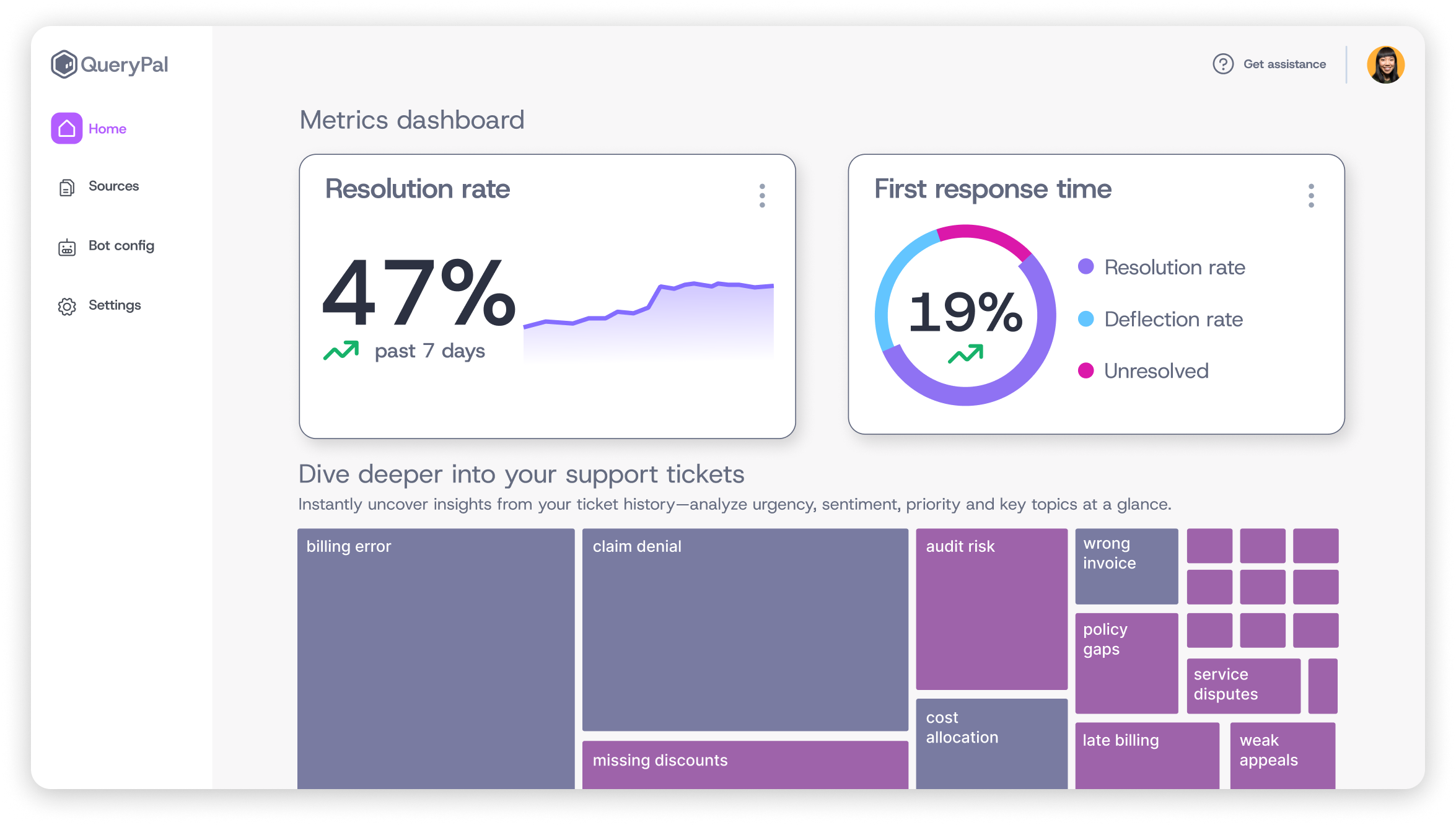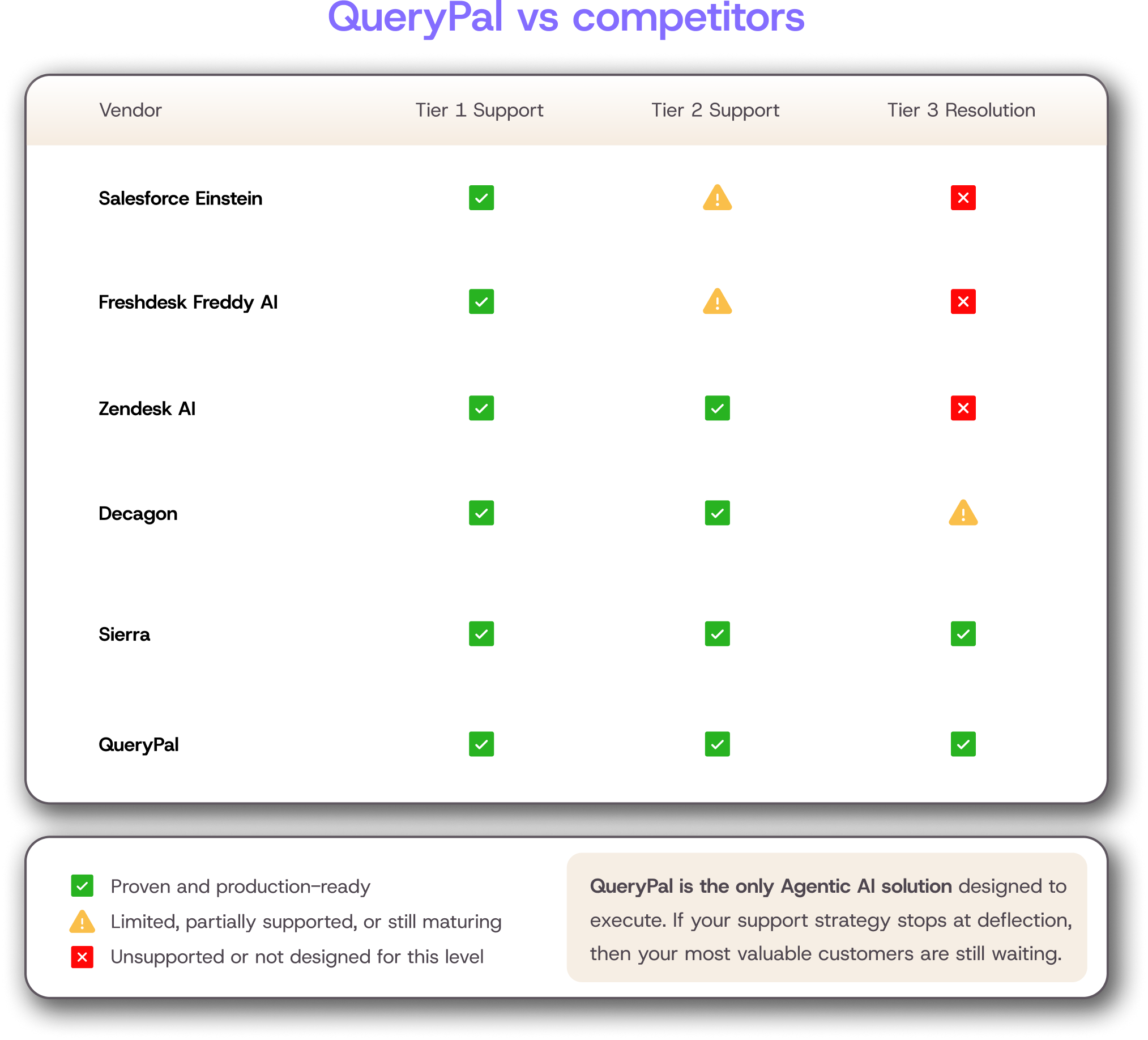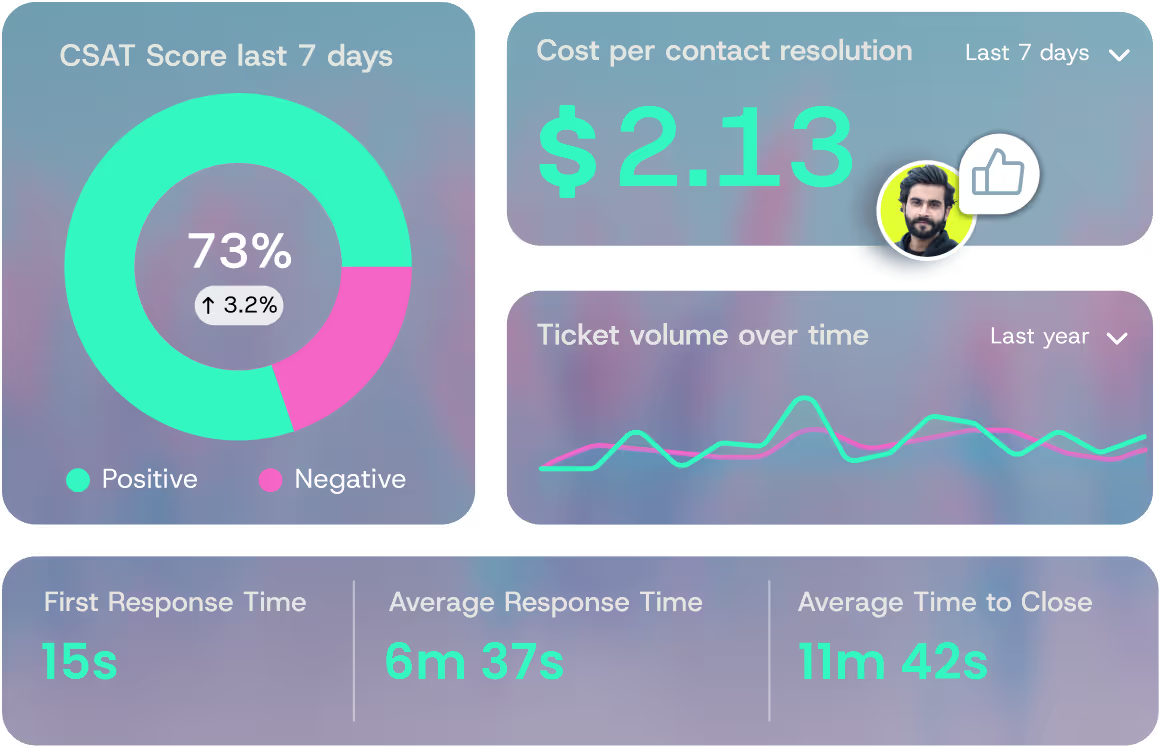The 15 Best Decagon Alternatives & Competitors in 2026
Customer support is changing fast. Simple chatbots are no longer enough for most companies.
Decagon AI also has strong features, but many teams find the setup, pricing, or technical complexity difficult to manage. If you are looking for customer support tools that fit smoothly into your workflows, this guide breaks down fifteen strong Decagon AI alternatives. Are you ready? Let's get started!
What is Decagon AI?
Customer service software may not sound exciting, but tools like QueryPal and Decagon AI are changing the field.
QueryPal focuses on solving issues quickly and reducing wait times for customers. Decagon AI uses language models to automate responses and learn from past conversations. It can handle tasks like billing questions without human input. [1]
Decagon has grown to a $1.5B market presence. However, moving data into the platform requires heavy setup. Pricing details are not clear, and most teams need technical support to launch it.
Why Companies Seek Decagon Alternatives
Many support teams want tools that work right away. They do not want to rebuild their systems or depend on large technical teams.
Other common concerns include:
- Setup time: Companies prefer tools that connect easily with what they already use.
- Developer needs: Some teams cannot afford to rely on in-house developers for every update.
- Pricing surprises: Usage-based billing can cause monthly costs to spike when ticket volume rises. Some teams have reported bills tripling in one month.
Because of these issues, many companies now prefer platforms with clear and fixed pricing. This makes costs easier to predict, which is important for growing teams. This shift has led many teams to explore comprehensive customer support automation solutions that offer predictable costs and easier implementation.
How We Evaluated These Alternatives
Finding the right AI support platform takes work. Our team started with QueryPal as a baseline, then compared it against several other tools. After weeks of research, we narrowed it down using a few core criteria.
Key areas we focused on:
- Integration Capabilities: We checked how well each platform connects with CRMs, help desks, and knowledge bases. Some tools promise broad integrations but fall short in practice.
- AI Sophistication: Strong platforms solve problems directly, not just recycle pre-written answers.
- Ease of Implementation: We looked at setup time, user interface, and customization. A tool should not require heavy coding expertise to get started.
Teams should weigh these factors carefully before deciding. Multi-criteria decision-making frameworks are often used in technology evaluations to compare options effectively. [2]
The 15 Best Decagon Alternatives for 2026
These platforms help businesses manage customer questions with less manual effort. Some are built for large enterprises, while others are designed for smaller teams with limited budgets. Each one brings its own mix of features and integrations.
1. QueryPal
QueryPal is a strong option for companies with strict data security needs. While most platforms require you to use their servers, QueryPal lets you self-host on AWS. This approach is especially popular with banks and regulated industries that cannot risk exposing sensitive data.
- Self-hosting on AWS is available (rare among competitors)
- Works with Zendesk, Salesforce, Slack, Teams, and more
- Full compliance with GDPR, SOC 2, and HIPAA
The platform also includes visual analytics with QueryPal Prism's enterprise analytics treemap visualization, showing you exactly which questions come up most often and where your knowledge gaps are. These colorful, interactive charts make it easy to spot trends at a glance, helping managers understand customer needs without digging through spreadsheets. For teams that want powerful AI without sacrificing control or visibility, QueryPal offers a unique combination that most competitors can't match.

2. Fullview
Fullview makes remote support faster by letting agents see exactly what customers see on their screen. Instead of customers struggling to explain problems, agents can step in directly. It feels like screen sharing, but without requiring extra effort from the customer.
- Cobrowsing is the main feature, allowing shared on-screen views
- Certified for compliance with major data protection standards
- Integrates with Zendesk, Intercom, and Salesforce
- Pricing is adjusted based on team size
- Typically reduces resolution times by about 30%
3. eesel AI
eesel AI works like a teammate who always knows the documentation. When a ticket comes in, it searches through your connected knowledge bases and suggests the best answer. This makes it especially useful when documentation is scattered across different tools.
- Integrates with Zendesk, Freshdesk, and other major help desks
- Searches Notion, Google Drive, and other knowledge sources
- Sandbox mode helps prevent inaccurate answers from being sent
- Standard cloud deployment with no special hosting options
- Pricing scales based on ticket volume
4. Sierra AI
Sierra AI is built to manage complex customer conversations. It can handle multiple requests in a single thread, such as refunds, address changes, and discounts, without breaking the flow. Many bots fail in these cases, but Sierra is designed for flexibility.
- Handles complex and multi-step conversations smoothly
- Strong API support for developers and integrations
- Enterprise-level security included in all plans
- Especially seamless Salesforce integration
- Pricing is adjusted based on customer complexity
For teams evaluating multiple options, our guide to Sierra AI alternatives provides additional insights.
5. Assembled AI
Assembled AI acts like a traffic controller for support. Routine questions go to automated responses, while urgent or sensitive cases get routed to human agents. Managers also get clear reports showing cost savings and efficiency.
- Real-time monitoring across all support channels
- Smart routing to assign cases to the right person or bot
- Works with Zendesk, phone support, and other tools
- ROI reports simplify budget and performance reviews
- Higher cost, but large teams often see significant savings
6. Voiceflow
Voiceflow allows teams to design chatbots visually, using flowcharts instead of code. It's easy to use, collaborative, and can be deployed across different platforms. Teams without technical expertise can build and launch bots quickly.
- Drag-and-drop builder with simple visual design
- Deploys to websites, Alexa, and other platforms
- Multiple users can collaborate without conflicts
- Free tier available for smaller teams or testing
- User-friendly interface suited for marketing and non-technical teams
7. GPTBots
GPTBots provides ready-to-use templates for common industries. Whether it's e-commerce, healthcare, or customer service, the setup process is fast. The platform also includes dashboards that clearly show cost savings, making it easier for teams to measure value.
- Pre-built bots for industries like retail and healthcare
- ROI dashboard with detailed cost-saving insights
- No programming skills required for customization
- Integrates with Shopify and similar platforms
- Money-saving guarantee included with plans
8. Cognigy
Cognigy is designed for global operations. It supports more than 100 languages with accurate translations and can connect with legacy enterprise systems. In addition to chat, it also manages voice calls, giving companies a unified communication tool.
- Full multilingual support with high-quality translations
- Works with older enterprise systems still in use
- Handles both chat and voice interactions
- Ensures data compliance with regional standards
- Pricing options include per-conversation or flat rate
9. Intercom Fin
Intercom Fin is the simplest choice for teams already using Intercom. Setup is quick, just activate the feature, and it immediately learns from past chat logs. The workflow for agents stays the same, but with added AI assistance.
- Instant setup for existing Intercom customers
- Learns from historical chat data
- Agents continue using the same workflow
- Included or available as an add-on, depending on plan
- Easiest AI option for Intercom users
10. Tidio Lyro
Tidio Lyro is aimed at small businesses that need affordable automation. For a low monthly price, it handles common customer questions around hours, shipping, or product details. Setup takes only minutes, and integrations with platforms like WordPress and Shopify are simple.
- Affordable pricing starting at $29 per month
- Quick setup in about 15 minutes
- Automates routine and repetitive customer questions
- Seamless integration with WordPress and Shopify
- Free version available for small or new businesses
11. Gumloop
Gumloop focuses on automating full workflows, not just answering questions. For example, if a customer reports damaged goods, it can create a support ticket, notify the warehouse, arrange a replacement, update inventory, and send tracking information, all without extra steps from your team.
- Automates entire workflows from start to finish
- Visual builder makes setup straightforward
- Connects with Slack, email, and other tools in your stack
- Includes templates for common business processes
- Pricing scales as your business grows
12. Kore.ai
Kore.ai is designed for industries with strict compliance needs, such as healthcare and banking. It comes with a full set of certifications and allows on-premise hosting. Built-in voice recognition adds another layer of account security.
- Compliance certifications include HIPAA, PCI, and SOC 2
- Voice biometrics for secure account verification
- Pre-configured options for regulated industries
- Can be deployed fully on-premise if required
- Compliance guarantees offered for enterprise clients
13. Gorgias
Gorgias is tailored for e-commerce companies. It gives support teams direct access to customer orders, shipping details, and returns in a single dashboard. It also tracks which conversations lead to sales, making it easier to connect support to revenue.
- Deep integrations with Shopify and BigCommerce
- Unified dashboard for orders, shipping, and returns
- Automates "where is my order" questions
- Provides data showing how support impacts revenue
- Pricing based on ticket volume
14. Zendesk Answer Bot
Zendesk Answer Bot is built directly into Zendesk, making it an easy option for existing users. It learns from your past tickets and improves automatically as agents interact with customers.
- Included with Zendesk for customers on higher-tier plans
- Trained automatically using historical ticket data
- Improves performance over time through continued use
- Requires one of the premium Zendesk packages
- Teams seeking more flexibility might explore comprehensive Zendesk alternatives
15. Microsoft Copilot Studio
Microsoft Copilot Studio is a natural fit for businesses already using Microsoft products. It connects with SharePoint, Teams, Outlook, and Excel, providing strong automation and enterprise-level security within the Microsoft ecosystem.
- Integrates across the entire Microsoft suite
- Backed by Microsoft's enterprise security standards
- Offers extensive automation capabilities
- Runs on Azure infrastructure for reliability
- Available through standard corporate licensing agreements
Key Features to Consider When Choosing
Choosing the right platform can be challenging. After testing many tools, these are the features that make the biggest difference.
Integration Capabilities
Support teams rely on many systems at once, and disconnected tools can create more problems than they solve. QueryPal integrates with everything from basic email to full enterprise networks. Its APIs are easy for developers to use, and data migration is straightforward.
Some platforms require teams to rebuild entire workflows during setup, which slows down adoption. Flexible integration is critical to avoid wasted time.

Action-Taking Abilities
There is a clear difference between tools that only answer questions and those that actually complete tasks. Support teams already manage a heavy workload, so platforms that take action directly can save significant time.
QueryPal's Concierge AI chatbot feature goes beyond simple suggestions. It updates tickets, processes refunds, and routes issues automatically. This reduces manual work for teams and helps customers get faster resolutions.
Security and Compliance
Strong security is essential for customer trust. SOC 2 certification covers the basics, while GDPR compliance is required for companies with European customers. Self-hosting options provide even more control by keeping data on your own servers.
QueryPal meets major compliance standards and allows companies to run everything on AWS if needed. This makes it a strong choice for industries with strict security requirements.
Implementation and ROI Considerations
Adopting a new system is rarely effortless, but the right platform should make the process as smooth as possible. QueryPal is designed to fit naturally into existing workflows, reducing the friction that often comes with large technology changes.
The platform also provides clear reporting on efficiency gains and cost savings, helping leaders evaluate return on investment. With features that reduce workload and improve resolution speed, support teams often see positive results soon after implementation.
Calculating Total Cost of Ownership
Support managers often dislike financial breakdowns, but the numbers here are easy to follow. Most platforms cost about \$50–75 per agent each month, with an average setup fee of around $2,000. In many cases, teams see ticket volume reduced by about 40% within the first month, which delivers a strong return quickly.
Pilot Testing Framework
A structured pilot test makes adoption smoother. The best approach is to start with a small group of 5–6 experienced agents. Give them four weeks to use the platform daily and track every key metric, including response times, ticket resolution rates, and customer satisfaction scores.
Some teams even add light internal competitions to encourage learning and engagement during the pilot phase.
Deployment Timeline and Training
Rolling out gradually works best for most support teams. A full rollout usually takes 6–8 weeks, giving everyone time to adjust.
- Week 1: Focus on basic features and simple workflows.
- Weeks 2–4: Introduce advanced functions step by step.
- Weeks 5–8: Scale to the full team and monitor progress closely.
This staged approach keeps the process manageable and helps teams build confidence steadily.
Choosing the Right Solution for Your Team
The best platform is the one that fits your workflows directly. Look for features that match daily needs, such as QueryPal Intercept's AI-powered ticket and email deflection during peak hours or intelligent routing during ticket surges.
Predictable pricing is also important, especially for teams that face seasonal spikes in volume. Platforms with fixed or transparent pricing models make budgeting easier.
Ease of setup is another key factor. QueryPal, for example, integrates smoothly with most systems, allowing teams to focus on solving customer problems rather than wrestling with new technology.
Finding the Right Fit Among Decagon Alternatives
Different platforms shine in different areas. QueryPal appeals to organizations that need self-hosted deployment and strict data security. Fullview and eesel stand out for their strong visual support capabilities.
When choosing among Decagon alternatives, teams should:
- Map workflows against platform capabilities
- Evaluate automation levels needed for daily operations
- Consider integration with existing systems
- Define clear support goals before pilot testing
Start small with a focused pilot, measure results carefully, and then scale with confidence.
For teams looking to move beyond simple ticket deflection and adopt automation that delivers real resolution, QueryPal is a strong choice. Book a demo to see how it fits into your workflows.
References
Read more
Activate your free
6 week trial
& white-glove integration support.
Cut support costs by 60%, slash response & resolution times, improve your customer experiences, & reduce agent burnout. Find some time with us to show you how.

